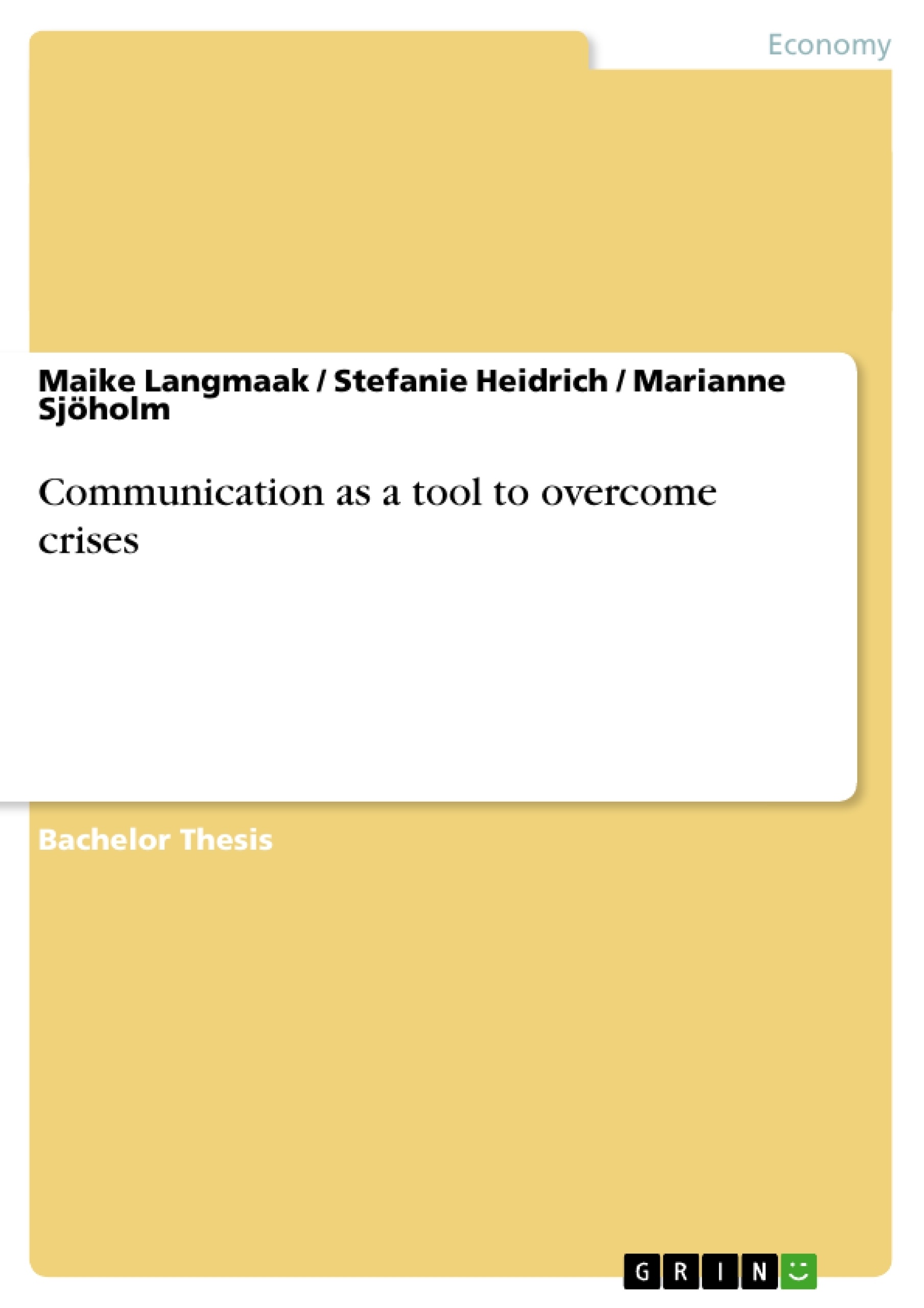Due to the fact that many companies have to deal with one or more crises, crisis management
has become a buzzword in today.s hyper-competitive business environment. The successful
management of crises is strongly influenced by the performance of a company.s internal as
well as external communication. This thesis investigates how communication serves as a tool
for an organisation to overcome a crisis successfully. In order to answer this question we
undertook broad theoretical research as well as deep empirical investigations.
Before starting our research, we carried out a methodological reflection. We chose to adopt
the hermeneutic approach in order to base our study on the qualitative approach rather than a
quantitative one. We think this is more appropriate for our thesis because crisis management
and communication cannot be sufficiently measured in statistical terms. Furthermore we used
theories to increase our understanding but we did not test them in our empirical part. Thus, we
describe our work as inductive as our empirical study is based on our research question,
which we generated from our theoretical pre-understanding.
We started by scanning the theoretical work that has already been done in the field of crisis
management. We chose to examine all stages of a crisis situation: before, during, and after.
Furthermore we combined these stages to the crisis communications process. All stages
involve several steps, which should be considered by an organisation in order to overcome a
crisis successfully. Before a crisis occurs a company has to get prepared by setting a crisis
management team, identifying and assessing possible risks, developing a crisis
communications plan, and recognising signs which indicate the appearance of a crisis. During
a crisis an organisation has to deal with the point-of-no-return and to activate its crisis
communications plan in order to respond to the crisis. Once a crisis is over the company has
to start to evaluate its performance with the aim of learning from the occurrence and of
improving the preparedness for possible future crises.
The next step when writing this thesis was to find a company, which experienced a crisis
situation in order to analyse its performance throughout the crisis. We have chosen Baxter, an
international medical health-care company, which has been stroke by a crisis in the year 2001. [...]
Inhaltsverzeichnis (Table of Contents)
- INTRODUCTION
- BACKGROUND
- Crises
- Communication as a part of Public Relations
- PROBLEM DISCUSSION
- OBJECTIVES
- LIMITATION OF THE RESEARCH
- THEORETICAL & PRACTICAL RELEVANCE
- Theoretical Relevance
- Practical Relevance
- BACKGROUND
- METHODOLOGY
- RESEARCH JOURNEY
- SCIENTIFIC PERSPECTIVES
- Positivistic Approach versus Hermeneutic Approach
- Deductive, Inductive and Abductive Approaches
- PRE-UNDERSTANDING
- General Knowledge of Theories
- Specific Knowledge
- Personal Attributes
- POSITIONING OF OUR RESEARCH APPROACH
- DATA COLLECTION
- Theoretical Data Collection
- Empirical Data Collection
- RESEARCH STRATEGY - CASE STUDY
- Qualitative versus Quantitative Approach
- VALUE OF THE STUDY
- THEORY
- CRISIS MANAGEMENT
- CRISIS DYNAMICS
- CRISIS COMMUNICATIONS PLANNING
- CRISIS COMMUNICATIONS PROCESS
- Before the Crisis
- Setting the Team
- Risk Identification and Assessment
- Developing the Crisis Communications Plan
- Before the Crisis
Zielsetzung und Themenschwerpunkte (Objectives and Key Themes)
This thesis examines the role of communication in successfully navigating a crisis within an organization. By conducting thorough theoretical and empirical research, the study aims to understand how communication strategies can be implemented effectively before, during, and after a crisis. The study focuses on the practical application of these strategies by analyzing the specific case of Baxter, an international medical health-care company, which faced a crisis in 2001.
- Crisis management and communication strategies
- The importance of effective communication during crisis situations
- The impact of communication on organizational response to crises
- The role of communication in building and maintaining trust during a crisis
- The application of crisis management principles within a real-world case study
Zusammenfassung der Kapitel (Chapter Summaries)
- Introduction: This chapter provides an overview of the study's background, problem discussion, objectives, limitations, and theoretical and practical relevance. The authors establish the importance of effective communication in managing crises and highlight the significance of their chosen case study.
- Methodology: This chapter delves into the methodological approach adopted for the study. It outlines the research journey, scientific perspectives, pre-understanding, positioning of the research approach, data collection strategies, and the value of the study. The chapter also discusses the use of both theoretical and empirical data in the study.
- Theory: This chapter presents a comprehensive theoretical framework for understanding crisis management and communication. It covers key concepts such as crisis management, crisis dynamics, crisis communications planning, and the different stages of the crisis communication process.
Schlüsselwörter (Keywords)
Crisis management, communication, public relations, organizational response, risk assessment, stakeholder communication, crisis communication planning, case study, Baxter, healthcare industry.
Frequently Asked Questions
How can communication help an organization overcome a crisis?
Effective internal and external communication helps manage stakeholder expectations, maintain trust, and coordinate a swift response to minimize damage.
What are the three stages of the crisis communication process?
The stages are: Before the crisis (preparation and risk assessment), During the crisis (activation of the plan and response), and After the crisis (evaluation and learning).
What should be included in a crisis communications plan?
A plan should include a designated crisis team, identified risks, predefined communication channels, and draft messages for various scenarios.
What can companies learn from the Baxter 2001 case study?
The Baxter case illustrates how a global healthcare company managed a significant crisis through specific communication strategies and organizational responses.
Why is the hermeneutic approach used in crisis research?
Because crisis management is qualitative and complex, a hermeneutic approach allows for a deeper understanding of meanings and processes that cannot be captured by statistics alone.
- Citation du texte
- Maike Langmaak (Auteur), Stefanie Heidrich (Auteur), Marianne Sjöholm (Auteur), 2004, Communication as a tool to overcome crises, Munich, GRIN Verlag, https://www.grin.com/document/26759



